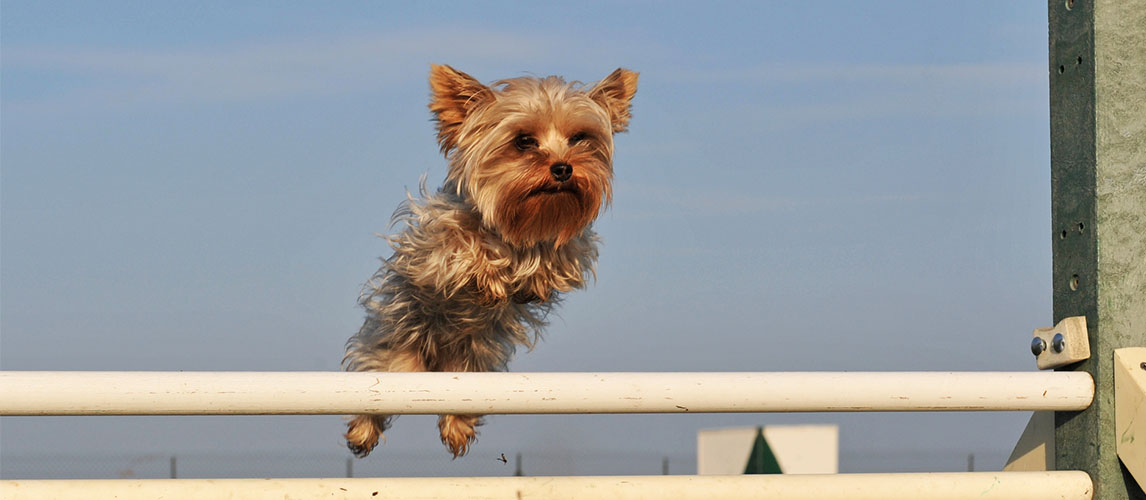Training your dog is one of those things that needs to be done but can start to turn into a bit of a chore, especially if your dog is none too quick on the uptake.
It’s important to stick with it though as a well-trained dog makes life so much easier in the long run. From the basics of toilet training so that you don’t come home to any unpleasant smelling mess to the more complicated commands like roll over, training can take time but it ultimately will mean that you can trust your dog to behave at all times. This will improve your relationship with your dog no end as will the actual process of training your pooch as you will be spending one on one time with them, which every dog will love.
However, it is so easy to get bored with training your dog and to start losing interest in trying to improve their reactions to your commands. Here, we look at ways to stay motivated when training your pooch – a puppy or otherwise – so that you both look forward to spending this quality time together, as opposed to resenting it and gaining very little from it. They are simple tips that are easy to implement but they can have a huge impact on the results that you see.
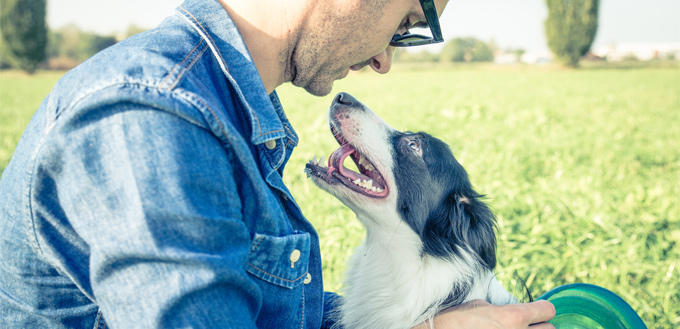
Try Training Little And Often, Not All Or Nothing
It can be so tempting to go at full speed when you first start training your dog. While intentions are good, this can mean that both you and your dog burn out exceptionally quickly and lose interest in training very soon.
Instead, try practicing with your dog slowly at first and start with some of the easier training you want them to master. For some this will mean becoming toilet trained, for others, it may mean just behaving on the lead. For toilet training, all you have to do is take your dog outside every half an hour to an hour, and when they come back in give them a doggie treat or praise. This is all that is needed in the very beginning.
Once they get used to you rewarding them with food, praise or dog toys, they will start to see you as the most exciting thing they know and will naturally start to want to please you. This will make the rest of your training easier and more pleasurable – so if you are already demotivated with training, try to strip your practice sessions back to basics. Dogs are bright creatures, but they are no Albert Einsteins. It’s important to treat them as such and aim their training at their ability and attention span. This means practicing with them little and often – just 10 minutes here and there every day can make a huge impact.
Find A Game You Both Like
We are all more likely to do something regularly if we actually enjoy it. Bearing this in mind, try to use games in your training that you both enjoy. If your dog likes chasing things, he or she will probably enjoy a game of fetch. Fetch can help teach the command “come here” as well as reinforcing to your dog that you are the most fun playmate on the planet by consistently throwing a ball for them.
This notion, of you being the most fun, is important for them to grasp as it makes them so much more likely to listen to you in the future. If they don’t think you’re fun, they’re likely to be more interested in continuing what they were doing in the first place or finding mischief elsewhere.
Plus you will get so much more out of it if your dog is enjoying the training you are doing with him or her. This means you are more likely to do their training regularly which has the knock-on effect of the training itself being much more effective and successful. It is, therefore, a win-win situation, simply by playing a game with your dog that you both actively enjoy.
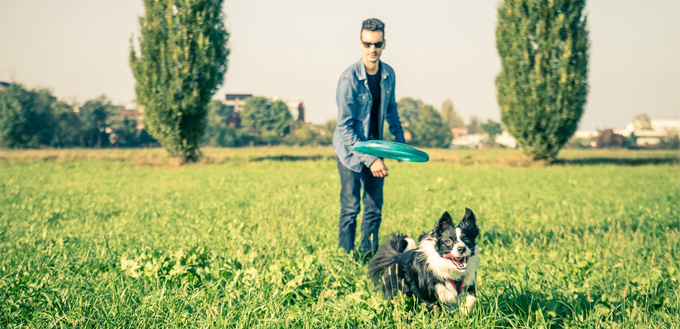
Change Up Your Walks
Walking with your dog is a good place to start your training. To maintain your dog’s (as well as your own) interest, change where you walk every so often.
Walking on and off the lead is an important skill for your dog to master as it will form the main part of their exercise. If your dog cannot walk on the lead properly, it will hinder your want and desire to even take them outside as it can be quite stressful if they are constantly pulling on the lead or barking at passersby. Additionally, if you cannot trust your dog to come back to you when you call, you will become increasingly likely to put off taking your dog for a walk.
Related Post: Dog Leashes
This is a great shame as a dog walk should be enjoyable for both the dog and owner as it is beneficial to all to get outside and exercise. It clears the head but also spending quality time with your pooch should be rewarding for you too. Changing where you take your dog will help maintain your interest and make a dog walk feel less like a chore – especially on those days where it is cold and grey outside.
Set Achievable Goals
Most of us start training our dog by diving straight in without truly thinking about what we want to achieve by the end of it. It is easy therefore to become disheartened by the results as we have not set ourselves a good measuring system for how far we have come with our dogs from where we started.
A big part of this tip is to remember to set goals that are achievable. You are setting yourself up for disappointment if you intend from the outset for your 12-week old puppy to be rolling over and walking to heel without a lead, in just four weeks’ time. Lower your expectations and set realistic targets instead.
Plus, by keeping your goals achievable, you are likely to keep going with your training and stay motivated throughout if you actually reach those targets. If you make them unrealistically hard, you are naturally going to become despondent and less likely to adhere to a training regime with your pooch.
Sticking With The Same Reward
Just like finding a game that your dog enjoys, it is essential to find a form of reward that they enjoy and respond positively to. If not, the training you are undertaking will be considerably less effective and successful. The reward needs to be something that they are willing to do anything to receive again and again. For most dogs, this will mean some form of food, but not all dogs are food led. In these instances, training toys or praise from you can sometimes be useful.
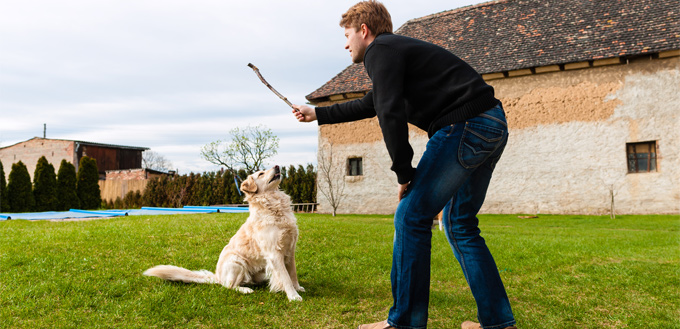
Repeating A Game They Dislike
Much like finding a game that they like, one thing that many owners can be guilty of is repeating a training method or game that their dogs simply do not respond well to. The frustration that this will cause to owners is large and is a big trigger for demotivation and discouraging a continuation of training.
It is not always apparent that a dog dislikes a form of training as they don’t have the same obvious means that we do as humans. However, signs like keeping the eyes averted from you or suddenly finding a blade of grass extremely interesting to sniff for ages, are all ways we can pick up on disinterest from our pups.
Not Rewarding Yourself
It may sound a little self-serving, but remember to take pride in what you have achieved as your dog’s owner with respect to their training. Training a dog is certainly possible but definitely not easy either. By not recognizing where you have got to from where you started, you will be doing yourself a disservice as well as increasing the chances of becoming unmotivated to continue.
This is an easy and common mistake to make and is a surefire way of wanting to stop any regime you have in place. This is a great shame for both you and your dog given that you probably have made much more progress than you give yourself credit for.
Give Attention For Attention’s Sake
A good way to maintain the power of training is to give your dog ample time just to relax with you and simply enjoy one another’s company. Dogs love having attention bestowed upon them by their owners and in doing so they are actually more likely to be responsive to you and your commands during your training sessions. This is because they want to please you will have increased as they will be even more devoted to the person that makes them so happy.
Plus, it’s nice for you to have some quality time with your dog where all you have to do is enjoy their crazy ways. Dogs loved to be petted or played within tug of war and you will enjoy seeing their happy reaction.
Don’t Think Of It As A Chore
A big way to stay motivated to keep going with your dog’s training is to change your mindset. It sounds like one of those simple things to do that may be more difficult to implement, but it really can make a huge difference to the results you see.
This is down to the fact that if you stop seeing training your dog as something you have to do as opposed to something you want to do, you will do it far more regularly and with far more interest than otherwise. The overall effectiveness and success of the training will, therefore, be far higher than if you see training your pup as one more thing you have to do on your to-do list.
Just try to relax and enjoy time out with your pooch!
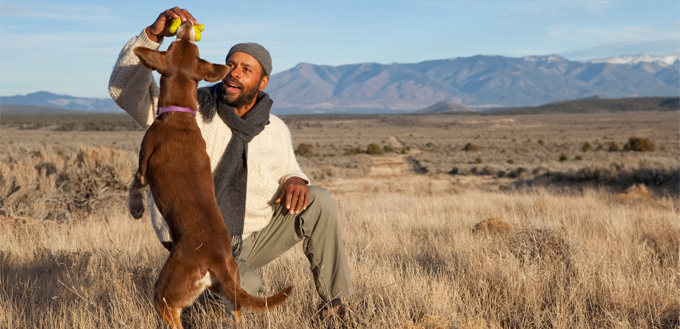
Remember The End Goal
So often it is very easy to forget why you are doing training in the first place. Yet, if we remember the end goal – a well behaved dog that can be left off the lead in even the most public and busy of places – it remains a great deal easier to keep going with training, even when it is going badly.
The end goal, therefore, becomes the main driver that will help us stay motivated to continue our dog’s training. So remember that a well-trained dog will make your life easier in the long run and your relations with your pooch ultimately far more rewarding as you trust them to behave and do as they are told far more.
Staying Motivated To Train Your Dog
All of these tips are easy and small alterations to what you are probably doing already. Yet they can make a massive impact on the overall success of your training regime and as a result, you will naturally remain motivated in the quest to make your dog one of the best behaved out there.
Overall, remember that a relationship with a dog is one to treasure and that it will be the most unique bond you have with almost anyone else. Training your dog is a way to enhance this so if you do start to become demotivated, take a breath, and remember your dog has the capacity to love you in the most rewarding way. Once you have this in mind, training will be a total breeze.
Sources:
- Victoria Schade, CPDT-KA, Dog 101: How to Train Your Dog, PetMD



